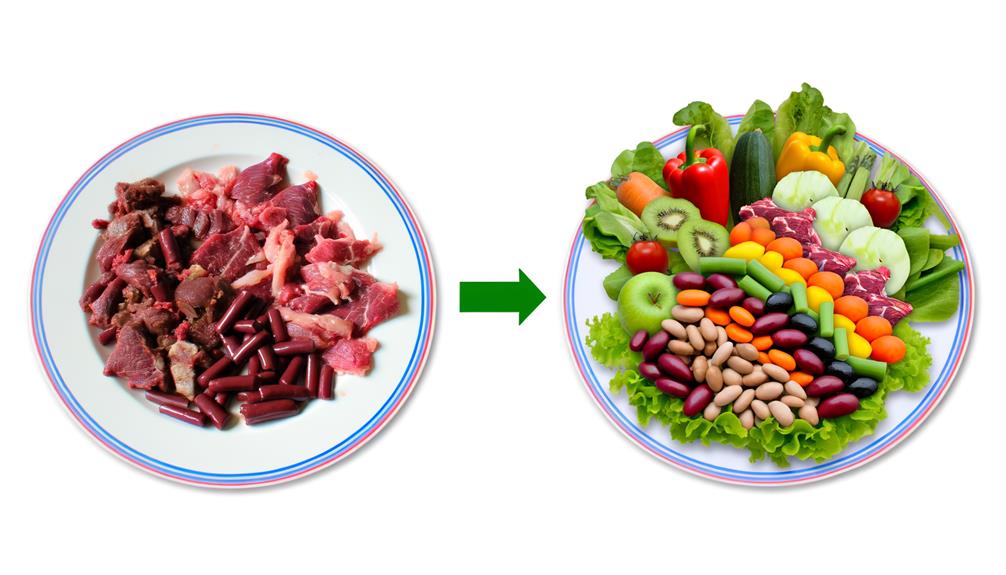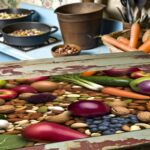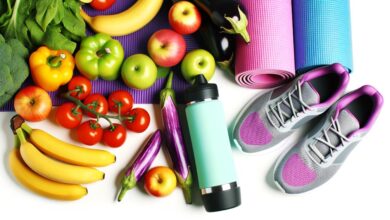Imagine you're a gardener, and your body is the garden. Though you might have always planted the same types of flowers and shrubs, you've discovered that some are more beneficial to the soil, the surrounding environment, and even the local wildlife. You're contemplating switching your garden over to these new plants, but you're unsure how to start. That's like shifting to a plant-based lifestyle. You've heard about the benefits, from reducing your risk of chronic diseases to helping stave off environmental degradation. Yet, you can't just uproot your habits and plant new ones overnight. So, how do you begin this transformation without feeling overwhelmed or deprived? Let's explore that.
Key Takeaways
- Plant-based alternatives offer a wide range of delicious and healthy options for meals.
- Plant proteins, such as beans, nuts, and chia seeds, are abundant and can meet protein needs.
- Overcoming challenges and setbacks in transitioning to a plant-based lifestyle is possible with small changes, experimentation, and finding support.
- Ready-to-eat vegan foods, like pre-packaged meals and snacks, can make incorporating plant-based options easier and more convenient.
Discovering Plant-Based Alternatives
Delving into the world of plant-based alternatives, you'll find a plethora of choices from meat substitutes to dairy-free options that can revolutionize your meals while boosting your health and being kinder to the planet. This journey of discovering plant-based alternatives, whether you're gradually shifting to a plant-based lifestyle or are fully plant-based, is an exciting exploration of foods that nourish both your body and soul.
Plant-based meals aren't just about skipping meat and dairy; it's about embracing the wealth of plant-based foods available. Think lentils, tofu, tempeh, and quinoa for protein. Consider almond milk, cashew cheese, and coconut yogurt as dairy swaps. They are not just substitutes but delicious options in their own right.
With plant-based eating, you're not merely switching to a plant-based lifestyle, but also broadening your culinary horizons. Experimenting with plant-based cooking can lead you to recreate favorite foods like veggie burgers, plant-based sausages, and dairy-free ice cream. So, eat more plant-based, serve others with love and nourishment, and celebrate the diversity and richness of a plant-based lifestyle.
Overcoming Protein Myths
As you explore the rich variety and culinary potential of a plant-based diet, let's debunk some common myths surrounding protein intake in this lifestyle. Overcoming protein myths is a crucial step in gradually shifting to a plant-based lifestyle.
- *Myth: Plant foods lack protein.* Fact: Many plant foods contain plenty of protein. Beans, nuts, wheat, and chia seeds are excellent sources.
- *Myth: Plant proteins are inferior.* Fact: The protein in plants can meet your needs when a variety of plant foods are consumed.
- *Myth: You'll always feel hungry.* Fact: A plant-based diet is one that can keep you satiated. Fiber-rich plant foods are filling.
- *Myth: You can't get enough protein without meat.* Fact: Plant-based nutrition can provide all the necessary proteins if you eat a diverse range of foods.
As you're making the switch, remember to learn more about plant-based proteins. This understanding will help you navigate your new lifestyle confidently. You'll not only be nourishing yourself but also serving others by inspiring a healthier, sustainable way of living. Embrace this journey with an open mind, and enjoy the myriad benefits that come with it.
Managing Mistakes and Setbacks
While diving into a plant-based lifestyle, it's inevitable that you'll stumble upon a few challenges, but that's okay. In fact, managing mistakes and setbacks is a crucial part of making the change. Each setback is a chance to learn and adjust your approach. Remember, this is your personal journey and everyone's experience is unique.
Here's a quick guide to help you:
| Challenge | Solution | Inspiration |
|---|---|---|
| Overwhelming meat consumption | Start making small changes, eat less meat gradually | People who've successfully reduced their meat intake |
| Missing certain animal-based foods | Experiment with plant-based alternatives, like plant-based milks | Recipes and stories from others who've made the switch |
| Struggling with the WFPB diet | Take it one meal at a time, learn new recipes | Connect with a community going through the same journey |
| Feeling deprived | Focus on abundance of plant foods, not deprivation | Success stories from people thriving on plant-based diets |
| Difficulty finding support | Seek out local or online plant-based communities | Courageous individuals who've navigated this path alone |
Moving towards a plant-based lifestyle isn't about perfection, but progression. Keep going, you're serving not just yourself, but also the environment and animals.
Incorporating Ready-To-Eat Vegan Foods
Navigating the journey towards a plant-based lifestyle, you'll find that incorporating ready-to-eat vegan foods can be a real game-changer, offering convenience without compromising on health or taste. There's a variety of these foods on the market today, from vegan sour cream to whole plant-based meals.
- Explore the vast array of vegan options available. These include pre-packaged meals like plant-based burgers or salads, perfect for a quick lunch.
- Always keep vegan snacks on hand. Hummus, veggie chips, and fruit cups are delicious and can help curb hunger between meals.
- Don't forget about frozen meals. A vegan diet doesn't mean you can't enjoy the occasional microwaveable dish. Many of these are whole foods, rich in nutrients.
- Consider meal delivery services. Many companies now offer ready-to-eat plant-based meals, making your transition even smoother.
These new foods not only support your health but also promote animal welfare. It can feel overwhelming at first, but remember, food blogs and online communities are great resources for tips and recipes. Embrace the journey and enjoy exploring the world of ready-to-eat vegan foods.
Exploring Benefits of Whole Foods
Diving into the world of whole foods, you'll quickly discover the range of health benefits that a plant-based diet can offer. In your transition to a plant-based diet, you'll be exploring new food items, from whole grains like brown rice to superfoods like chia seeds.
Here's a quick guide to get you started on your plant-based journey:
| Food Type | Example | Benefit |
|---|---|---|
| Whole grains | Brown rice | Rich in fiber and helps in weight management |
| Superfoods | Chia seeds | High in Omega-3 fatty acids and great for heart health |
| One plant-based meal | Vegan stir-fry | Can lower risk of chronic diseases |
Switch to a plant-based diet and experience the benefits of whole foods. It's not just about your individual health, but also about serving our planet. Plant-based cooking has a lighter environmental footprint and is more sustainable. Plus, it's budget-friendly.
Vegan and plant-based lifestyles are health-focused, empathetic, and culturally-informed, suitable for all stages of life. So, why not make the switch today and explore the world of whole foods?
Frequently Asked Questions
How Do I Transition to a Plant-Based Lifestyle?
You can easily transition by slowly swapping meat with substitutes, trying dairy alternatives, exploring plant-based recipes. It's crucial to understand nutritional requirements, overcome cravings, and learn grocery shopping and food preparation techniques.
What Happens When You Switch to a Plant-Based Diet?
Switching to a plant-based diet, you'll notice better nutrition absorption, health improvements, and digestive changes. You'll manage weight easier, notice increased energy, mental clarity, improved skin, sleep, and possibly reduced allergies. It could even help in disease prevention.
How Do I Become a Vegan Gradually?
You're making a big step, it's not easy. Start by swapping one meal a day for a plant-based alternative. Try new recipes, explore vegan shopping, and focus on plant-based proteins. It's a journey, embrace it.
How Long Does It Take to Transition to a Vegan Diet?
Transitioning to a vegan diet varies for each person, but it's not overnight. It'll take time to navigate vegan challenges, dietary changes, and meal planning. Be patient with taste adaptations and remember, you're not alone.







